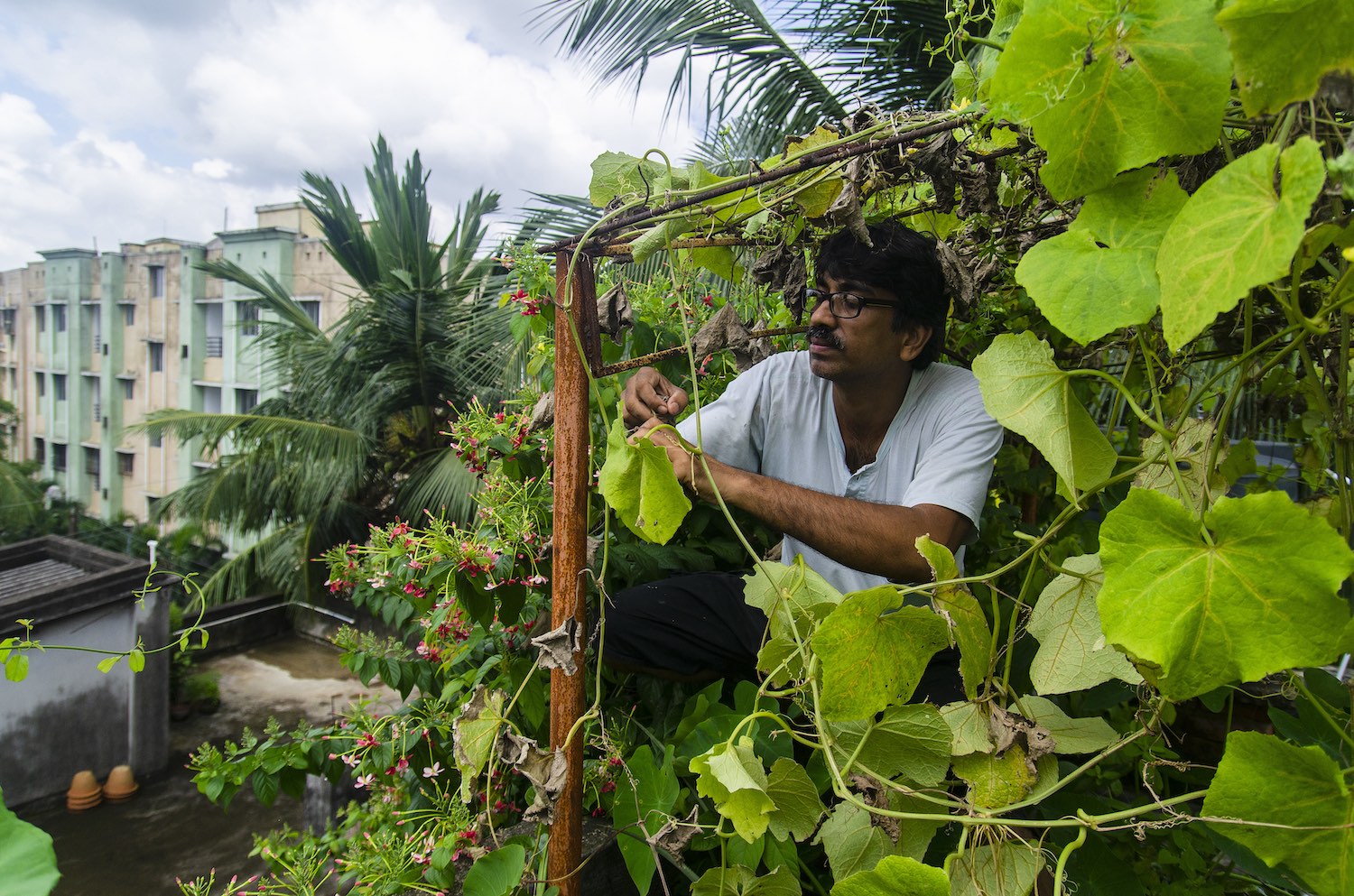Applying for the Oxford Climate Journalism Network: Everything you need to know

A man works on his rooftop garden in Kolkata, India. Credit: Sudip Maiti / Climate Visuals Countdown
In July 2022 we published a piece reflecting on what we had learned from the very first cohort of the Oxford Climate Journalism Network (OCJN), a project launched by the Reuters Institute with the goal to improve climate coverage around the world. We wrote about the aspects where members were struggling, but also about their many important firsts: their first climate story, a new climate desk, new jobs, new awards – or simply a new community, and a renewed sense of purpose in this all-important job.
On 19 September, we marked another milestone by opening up applications for cohorts 5 and 6 of the project: 200 journalists who will join us over the course of 2024. We are already halfway through our fourth cohort at the OCJN, with a community that is now roughly 400 journalists in more than 100 countries, plus many others who have joined our climate leadership courses, served as guest speakers, or attended a session at the invitation of a member in their newsroom.
Dozens of climate scientists and experts from around the world have also provided their time and expertise to our members, speaking to us about everything from climate policy to climate psychology, biodiversity, finance, mental health, attribution and much more.
Members have joined sessions at 1am in Sydney and 5am in San Francisco, while commuting on the bus in Mexico City or making dinner for kids in Nairobi, from chaotic newsrooms in Delhi and from busy living rooms in Ottawa. Our members include junior breaking news reporters and experienced editors-in-chief, and every possible beat and newsroom position in between.
If you are considering applying for the OCJN, this piece might help you understand what the network is, why you should apply (and when you shouldn’t), and how it might be helpful for you and your newsroom. I hope you read and share with those who might be interested in joining us.
You can see how climate change is impacting your work—but you are not necessarily sure where to start. Would the OCJN be able to help with that?
We think it would. Our members tend to be divided in half. Roughly one half are climate, environment and science reporters, while the other half are journalists from all other beats and newsroom positions.
Both groups benefit from the OCJN, but if climate is not your usual beat, we’d like you to consider applying. Chances are, in some way or another, you’re already covering climate change – our climate network can just help you feel confident doing it.
Our approach since the beginning has been to build coverage across beats: we want you to feel confident reporting or editing climate stories that are also sports, politics or business stories. If you are a complete beginner, don’t worry – we provide extra resources to help you get up to speed.
The programme is held in English, and lectures require quite a high degree of comprehension. However, for most of our members, English is their second or third language, and you’re never expected to have “perfect” English or to speak or write in front of the entire group if you don’t feel confident about your language skills. We provide occasional events in other languages for members. We also know the quality of internet access varies, and we make adaptations for this.
You want to be part of a structural change. How should you frame your application statement?
We are very serious about supporting our individual members and their careers. You are admitted to the network as a journalist, not as your specific job title. But we ultimately exist to help support a structural change in how climate change is covered around the world. As a result, it’s a good idea to understand how you fit into this change when you apply, and where your involvement can have a ripple effect on others.
Are you the only climate journalist in your country? Are you a climate journalist who really needs support and community to keep going? Are you totally lost when it comes to integrating climate coverage into your beat? Are you struggling with how to get engagement from your audience on climate, or about how to start in a new role in your newsroom where you feel you need to know your stuff? Are you trying to figure out how to talk about climate on the culture desk or while covering the World Cup? Are you grappling with how to prepare your newsroom for another season of fires, or floods?
When you apply, it helps to point out what sets you apart, where you can spur change, and what you feel you need support on. If you’re applying, we assume you care about climate change and think it’s important. Use your statement instead to show us who you are. If you are a freelancer, pointing out your role in producing structural change is a particularly good idea.
Pro tip: make sure you have the support from your newsroom and the time in your schedule to devote to the OCJN.
The programme covers 12 mandatory seminars, plus a mandatory introductory and exit seminar (you can see more details about the schedule here.) Everything else is optional: workshops, guest lectures, discussion groups and story clinics. We adapt the schedule and the extra offerings based on what each cohort needs, and what’s going on in the world during that period.
For example, if your cohort overlaps with COP, we will help you prepare to cover it. We also offer every member a chance to talk one on one when the cohort begins.
You can adapt your level of involvement to what you need from the network, but we find you get what you put into it. And although this is a free initiative, we take your involvement seriously, we take supporting you seriously, and members generally take the programme very seriously.
As a result, we can and do remove members from the cohort due to lack of engagement, but this is quite rare. We usually find a solution when life events intervene.
Keep in mind that your time at our climate network can be a busy six months. You will still be invited to events as an alumni, but they will be optional and much less frequent.
Who shouldn’t apply to the OCJN?
Our climate network is not open for communications professionals, students or full-time journalism professors or academics. We recognise there is often overlap between NGO work, journalism, and teaching, especially for freelancers. But generally, we only have the capacity to admit full-time journalists, and the discussion and content is developed for this group. We recommend that students, including those doing a masters’ degree on top of work, apply for our climate network only after they graduate.
If you are accepted but can’t attend the programme due to a major life event, including parental leave or a job change, we can sometimes offer deferrals, but generally not once the programme has started. That said, again, we usually find a solution when this happens.
I’ve applied before and didn’t get in. Should I apply again?
This depends. Although we usually don’t offer individual feedback, there are some things to keep in mind. It’s quite rare that not receiving a place in the cohort reflects your quality and experience as a journalist, so please don’t take it personally.
Each OCJN cohort is built around a balance of members, particularly for geographic diversity and a mix of climate and non-climate members. That means each application is assessed within its own country or wider region – an applicant from Kenya generally wouldn’t be competing with an applicant from the UK, but applicants from Germany and the UK might ultimately compete for a spot. Larger countries tend to get more spaces, but not to a huge degree.
Some countries are nearly always incredibly competitive, and we always end up not accepting fantastic journalists. As a rule, this includes the UK, Germany, Kenya, Nigeria, India, and Brazil. It may be particularly worth applying again with a fresh statement if you are from one of these countries. We often admit people after they’ve applied multiple times, especially if their colleagues have already been represented in past cohorts. Often a great application or letter, or an interesting role or beat, is what tips the balance for an applicant but that’s not always the case.
If you applied but your application was incomplete, or your statement or support letter were incredibly short or not in English, you probably weren’t admitted. If you applied as a student or you were working at a comms or NGO role, or for an outlet that was difficult to verify, that’s probably why. The same goes if you applied late.
If your situation has changed or you can make a simple correction or tweak to your application, by all means please apply again. Although we understand not getting admitted sucks, the most effective response is simply staying in touch (not sending us angry emails.)
A final word
Though we don’t have the capacity to check everything, we do try to check outlets and social media presence and verify things we’re unsure about with our wide network of members and alumni. If we see any hint that an applicant has misrepresented their background, to us or in the past, they’re usually disqualified from the application process.
By the same token, being part of the Oxford Climate Journalism Network isn’t and shouldn’t be mis-represented as a degree or employment at the University of Oxford.







